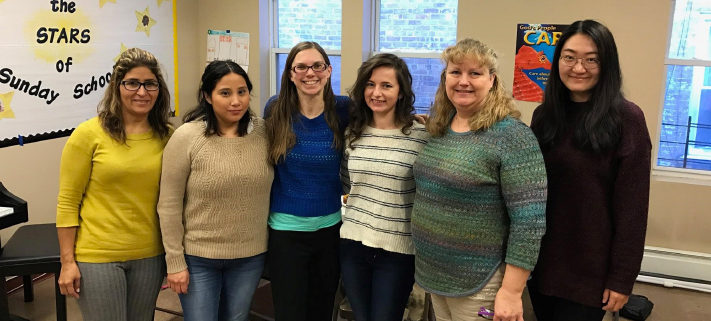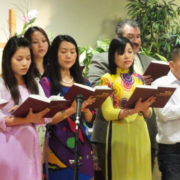Connecting Chinese people with the gospel
Rachel Hartman and Timothy Bourman
A worldwide effort
Sometimes, I don’t think we get this, but so much of our mission work is a truly synodical, worldwide effort. Jennifer Yao was a college student in her home country in Asia. She was befriended by WELS contacts and baptized in Asia. As she looked into graduate programs in finance, she was accepted by St. John’s University in Queens, N.Y. She made the move halfway across the world. Our contacts in Asia sent me a message saying, “We have a friend moving to your area. Can you reach out to her?”
The rest is history. She took our Bible information class at Sure Foundation, became a member, and now teaches Sunday school. Jennifer is just one story of already more than one hundred people confirmed as adults at Sure Foundation in the last eight years.
In fact, we take great pride in what God is doing through our synod all over the world. Our Sunday school teachers are a great example of what God is doing through his powerful gospel all over the world. Our team hails from Peru, Mexico, Wisconsin, Ukraine, California, and Asia. The team teaches a growing group of children from places just as diverse and just as beautiful. Through our synod and our congregation in New York City, God truly is working to make disciples of all nations.
Timothy Bourman is pastor at Sure Foundation, Queens, New York.
Many ways to share the same message
At the beginning of 2017, Chinese women of Saviour of the Nations in Vancouver, Canada, planned a Chinese New Year celebration.
“It’s a big deal,” explains Geoff Cortright, pastor of the congregation. “For them, it’s the biggest holiday of the year. It’s a little like Christmas, Thanksgiving, and the New Year rolled in to one.”
During the initial planning, a question came up regarding what to do with the red envelopes. Traditionally, red envelopes containing money are given as gifts, especially to children, during the New Year celebration. They are considered a way to wish recipients good luck for the future.
After discussing it, the group decided to fill the envelopes with Bible passages instead of coins, notes Cortright. “We incorporate their culture into Christianity without compromising our faith.”
Opportunities in neighborhoods
Vancouver has one of the highest concentrations of Chinese people in North America, per the 2016 World Population Review*.
Many come to the area in search of a top education for their child, explains Cortright. While there, they frequently look for ways to learn English and are often intrigued by Christianity.
Ottawa, Canada, is another destination for Chinese immigrants. Outreach efforts there began when Wayne Halldorson, who serves as pastor at Divine Word, saw an advertisement at the public library. The ad listed information for the Chinese Cultural Centre of Ottawa.
Halldorson got in touch with the organization and connected with individuals through it. “It gave us an opportunity to meet with people and share what we are all about,” he mentions. The Chinese outreach efforts have developed over time. “They have come to know that we’re the place to learn biblical doctrine,” he says.
While some neighborhoods have a long-established Chinese population, others are shifting and presenting new chances to share the gospel. Such is the case for the area surrounding St. Andrew in Chicago. The blocks around the church were at one time filled predominantly with German and Polish residents. They then transitioned to Hispanic families and now are trending more to Chinese families, explains Adam Gawel, who serves at the congregation. “The Chinese could be a majority in the next several years.”
Still other places are finding ways to connect to Chinese people, even if they didn’t grow up in the area surrounding the church. Joshua Yu of St. John’s in Wauwatosa, Wis., helps coordinate efforts to bring Chinese international students into the area. While there, they participate in a program known as a “bridge class,” in which they attend eighth grade at a Lutheran school to prepare for a potential transition to a public or Lutheran high school.
Currently, 67 WELS congregations report they have Chinese members. Furthermore, nearly every area Lutheran high school has Chinese students.
Reaching out in various ways
In New York, Chinese students at nearby universities frequently visit Sure Foundation. Many of them first heard of Christianity and were baptized while living in Asia and come to Sure Foundation on referral from those they met back in their home areas.
“The majority of immigrants are Chinese people coming in to the city. Typically they’ve been baptized but not instructed. We then instruct them, and they become members,” notes Tim Bourman. The congregation has bilingual Bibles, such as an English and Mandarin Bible, available for them to use. Some opt to study just in English.
Saviour of the Nations in Vancouver offers English classes to reach out to the community. One student named Annie initially came to Vancouver with her son for his education. After beginning in English classes, she began to study the Bible as well. “I teach instruction classes in English, and the questions and Bible are in Chinese,” says Cortright. He gave her a Bible in the spring of 2016 and months later, it was filled with notes. Annie was baptized on Christmas Day in 2016.
“Networking is about the biggest ‘in’ to the community,” explains Halldorson. “We want to have the reputation of being the best place to learn about the Bible. We offer Bible instruction classes in English and Chinese.”
Teaching just the Bible is a strength in our fellowship, explains Halldorson. “We are very into teaching and understanding and have zero tolerance for false teaching. I find in the Chinese mindset they have a hunger for that. They like that it’s logical and cohesive; it’s objective and concrete and clear.”
Divine Word has held open houses and potlucks to reach out to more Chinese as well.
“Especially in newer urban areas of global cities, if you can open that door and make one or two contacts, you’re in a fabulous position,” adds Halldorson.
St. John’s holds a regular service in Mandarin for those transitioning into a new culture. First-generation Chinese Americans often attend the Mandarin worship, while second-generation Chinese Americans tend to prefer an English service.
And while many Chinese only attend St. John’s for an average of two years, they leave the place equipped with the gospel message to share with others, regardless of where they go.
Rachel Hartman and her husband, Missionary Michael Hartman, serve in Leon, Mexico.
This is the second article in a series about cross-cultural outreach in the U.S.
SUBMIT YOUR STORY
Do you have a manuscript, idea, or story from your own life you’d like to share for use in Forward in Christ or on wels.net? Use our online form to share it to our editorial office for consideration.
SUBSCRIBE TO FORWARD IN CHRIST
Get inspirational stories, spiritual help, and synod news from Forward in Christ every month. Print and digital subscriptions are available from Northwestern Publishing House.
Author: Rachel Hartman and Timothy Bourman
Volume 104, Number 4
Issue: April 2017
Copyrighted by WELS Forward in Christ © 2021
Forward in Christ grants permission for any original article (not a reprint) to be printed for use in a WELS church, school, or organization, provided that it is distributed free and indicate Forward in Christ as the source. Images may not be reproduced except in the context of its article. Contact us




